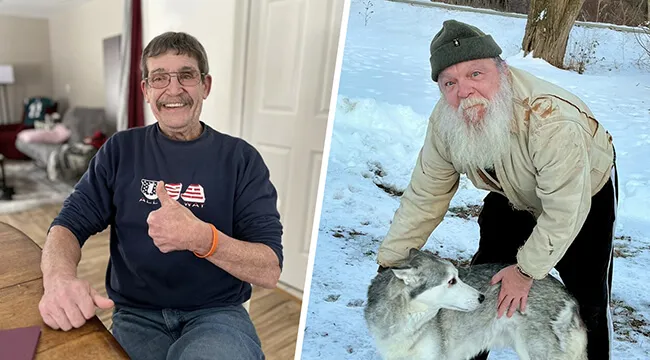UVM Supportive Services for Veteran Families Program Serves Homeless Vets
For the past 12 years, over one thousand veterans from Vermont and New York have received assistance for transitional or permanent housing thanks to the Supportive Services for Veteran Families (SSVF) program at the University of Vermont. In 2013, Thomas Simpatico, M.D., a professor of psychiatry at the UVM Larner College of Medicine, was awarded an SSVF grant from the U.S. Department of Veterans Affairs. Administered at the Given Building since 2013, this grant has helped very-low-income veteran families who are homeless or imminently at risk of homelessness gain and retain stable housing.
“SSVF got me out of a camper with no running water and gave me a place to live. I feel really good about having my own place. It gives me self-confidence and self-worth. The process of finding housing was easy for me thanks to my housing service coordinator, who helped me through the entire process and walked me through all of the paperwork. This program has helped me a lot, personally. I would recommend it to any veteran who needs a hand with housing support.”
— Ron R., Highgate, Vermont
Helping Homeless Vets in Vermont and New York
UVM’s SSVF program, the only university-based entity among 249 nationwide SSVF programs, has consistently been recognized for its excellent outcomes, resulting in consistent increases in annual allocations from the Veterans Administration. “We are using our unique status to create exportable innovations for SSVF programs across the country,” said Simpatico, highlighting the program’s commitment to transformation.
The SSVF program at UVM assists 165 veterans annually, on average. Last year, the services supported 161 veteran households with such resources as rental assistance, security deposit assistance, and/or arrear payments for 82 unique clients, resulting in the prevention or resolution of homelessness. The geographic area of assistance covers all 14 counties in Vermont, as well as Clinton, New York.
Currently, 16 staff members provide a wide variety of services to veterans, including but not limited to housing counseling; financial counseling; connections to health care navigation; connections to VA benefits and programs and/or public benefits provided by federal, state, and local agencies; connections to SSI/SSDI Outreach, Access, and Recover (SOAR) services; connections to legal services; and temporary financial assistance.
“Without a home I was angry and (had) no hope. This program saved me. There are no words I say that speak how I feel ... but thank God for their help. I’ve had way more things and money at times ... but I’ve never been more thankful than when I have nothing and nowhere to go. You, your program, all your people that I met ... gave me courage.”
— Richard M., Poultney, Vermont
Rebecca Brown-Gural, program director for SSVF at UVM, has spent the past eight years overseeing the program and witnessing its evolution. “Through the Supportive Services for Veteran Families (SSVF) program, we are committed to ensuring that veterans and their families have access to the resources and support needed to secure stable, permanent housing and build a path to long-term independence and success,” she said. Josey McDonald, service coordinator for the program, added, “Our role is to get resources to help veterans with their day to day, connecting with a community that’s comfortable.”
SSVF at UVM welcomes public input and community feedback for continuous improvement, particularly from those who know of a veteran population or need that is not being met in the community. A referral form is available on the SSVF at UVM website.
Background on the SSVF grant
In 2008, the U.S. Department of Veterans Affairs developed the Supportive Services for Veteran Families (SSVF) program, authorized by Section 604 of the Veterans’ Mental Health and Other Care Improvements Act of 2008. According to the VA website, the goal of the SSVF is to support very-low-income veterans with case management and supportive services to “prevent the imminent loss of a veteran’s home or identify a new, more suitable housing situation for the individual and his or her family; or to rapidly re-house veterans and their families who are homeless and might remain homeless without this assistance.” Since inception, supportive services grants have been awarded to selected private non-profit organizations and consumer cooperatives that will assist very-low-income veteran families residing in or transitioning to permanent housing. Grantees will provide a range of supportive services to eligible veteran families that are designed to promote housing stability.
Read more about the federal Supportive Services for Veteran Families program
